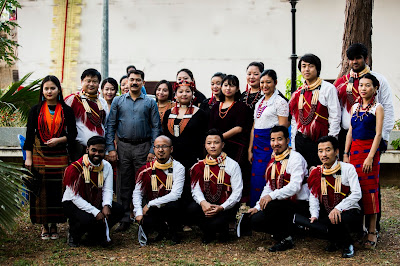By
Shevlin Sebastian
When the Ao Naga Choir members step on stage at the Bastian Bungalow, Fort Kochi, at a recent show, organised by Spic Macay, they immediately catch the eye with their striking costumes: the men, in white shirts and black trousers, with a red sash across their chests. As for the women, they are in red, white, blue, and orange skirts and wraparounds, with traditional beaded necklaces.
Lanu
Yaden, the man behind the choir, and a participating singer says that
the red sash is of the Ao Naga tribe, which is one of the larger
tribes in Nagaland. “There are more than twenty tribes,” says
Lanu. “The different colours worn by the women represent the
different tribes.”
Following
an introduction, the concert began, unusually, with a Rabindranath
Tagore poem called 'To the unnamed light' which had been set to music
by the late Filipino composer Francisco Feliciano.
It
took a while for the audience to get into the rhythms of the band
since there was hardly any musical accompaniment. “Our strength is
in the A acapella (a group or solo singing without instrumental
accompaniment),” says Lanu.
The
songs continued: Alleluia by composer Ralph Manuel, 'My Heart is
Steadfast', a songcomposed by Naga composer James
Swu, works by British
composer John Rutter and even a Mozart classic, 'Ave Verum Corpus'.
The
singers, despite the name of their choir, are all based in Delhi.
They work in various professions but the majority are music teachers.
Set up in 2009, the 'Ao Naga Choir' is steadily gaining in
reputation. They have performed thrice for the President of India and
twice for Prime Minister Manmohan Singh. They have participated in
concerts in Colombo and Salzburg, where they sang Mozart's Coronation
Mass at the Cathedral. “It was a proud moment for all of us,”
says Lanu.
In July, the band will be touring Budapest and Vienna where they will be performing at the United Nations Office. They will be presented with the 'Angel Of Peace Award' at the World Peace Choral Festival, for promoting culture and world peace through choral singing.
Asked
about their repertoire, Lanu says, “It could be anything from
Renaissance music to western classical, all types of church music,
operettas and Broadway musicals.”
Meanwhile,
wherever they perform, whether it is India or abroad, they are always
asked whether they are from India. “While abroad, this question
enables us to talk about our Indian culture and its diversity,”
says Lanu. “In India, some know where Nagaland is. For others, we
have to sketch it on our palm and explain that we share a border with
Myanmar. Many are aware of the Naga regiment of the Army.”
As
for the band members, many of them were coming for the first time to
South India. “Most have only been to Mumbai,” says Lanu, who is
an exception. He did his Plus Two from St. Joseph’s College in
Bangalore. Later, he completed his Bachelors in history from St.
Stephen's College, Delhi.
For
all the band members Kochi was an eye-opener. “There are a lot of
European influences, especially in Fort Kochi,” says Lanu. “It
was a wonderful opportunity to educate the younger members about the
history of Fort Kochi. We enjoyed seeing the Chinese fishing nets,
which we had only seen in photos.”
The
choir members also appreciated the liberal culture. “The waiter in
the restaurant that we stayed in was a Brahmin, but he had no qualms
about serving us non-vegetarian food,” says Lanu. “We said, ‘Will
it offend you?’ and he said there was no problem. It was reassuring
to know that people accepted differences with grace and harmony.”
And
they also had heart-warming experiences. There was a group of
tourists from Salzburg, Austria. “After the event was over, they
came running after us to say that they were so happy to hear Mozart
in Fort Kochi,” says Lanu. “They have always heard it inside a
church with the accompaniment of string and bass instruments, which
usually drowned the vocals. They said that hearing the song in a
foreign country and in such a setting was surreal but exciting, as
well. We were all very touched and elated.”
(The
New Indian Express, Kochi, Thiruvananthapuram ands Kozhikode)


No comments:
Post a Comment